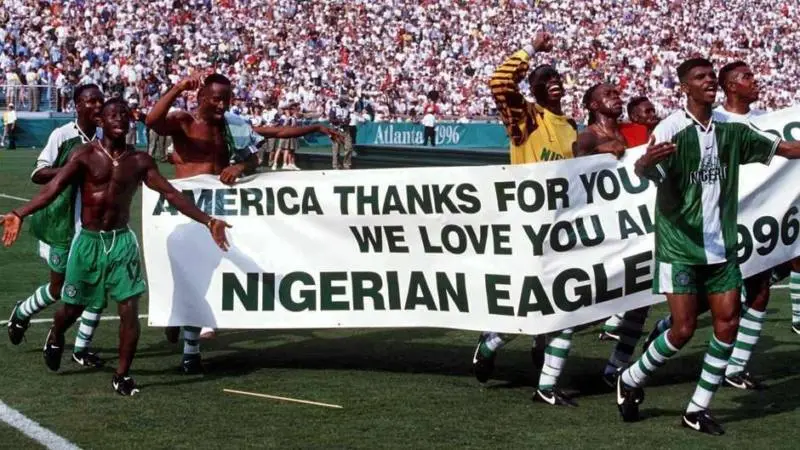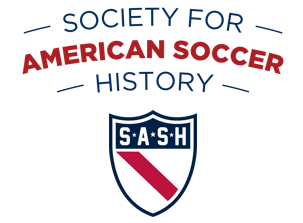
“The Archives Room” features Roger Allaway’s articles from his Big Soccer blog, which ran from 2010 to 2013. Look for “The Archives Room” to appear the first and third Wednesday of each month.
After the scoreless final of the 1994 World Cup, another event in the United States just two years later, the 1996 Olympic Games men’s soccer tournament, stands in stark contrast, and deserves to be remembered a lot better than it is. The Nigeria-Brazil semifinal and the Nigeria-Argentina final produced a total of 12 goals and one of the most rip-roaring finishes to a significant tournament in world soccer history.
Olympic men’s soccer has often been a rather strange contraption. From 1952 through 1980, the tournament was dominated by Communist countries who fielded their full national teams and insisted, despite the world’s knowledge that it was a sham, that all their players were amateurs. Professionals now are allowed in the Olympics, but the under-23 teams that play in the Olympics these days tend to be third-string national teams, if that.
The 1996 tournament was better, however, at least in the final stages. Brazil had never won the Olympic soccer title and thought it saw an opportunity to change that. Since the previous year, it had been using its Olympic team in full internationals as part of that campaign, but that wasn’t really much of a sacrifice. Since the 1994 World Cup, Brazil had developed three new superstars in Ronaldo, Juninho and Roberto Carlos, and all three were under 23. In addition, the Brazilian team at these Olympics included such other national-team mainstays as Bebeto, Rivaldo, Aldair and Flavio Conceicao.
Still, Brazil got through the group stage with not much to spare, suffering an upset against Japan and advancing only on goal difference. In the quarterfinals, Brazil looked the way it was supposed to, leaving Ghana in the dust with three unanswered goals in the second half of a 4-2 victory. The other particularly impressive quarterfinal winner was Argentina, which beat defending champion Spain, 4-0, with a team that included Hernan Crespo, Roberto Ayala, Ariel Ortega, Diego Simeone and Javier Zanetti. Nigeria beat Mexico, 2-0, and Portugal beat France, 2-1.
For the semifinal between Brazil and Nigeria on July 31, 1996 in Athens, Ga., Nigeria was able to counter Brazil’s stars with its own galaxy of national-team luminaries such as Daniel Amokachi, Nwankwu Kanu, Emmanuel Amunike, Jay-Jay Okocha, Victor Ikpeba, Taribo West, Sunday Oliseh and Celestine Babayaro.
Brazil’s momentum from its outburst against Ghana extended into the first half against Nigeria. By the 37th minute, it had a 3-1 lead on two goals by Flavio Conceicao and one by Bebeto, and it kept that margin until 15 minutes were left in the game. In the 76th minute, a pass from Amokachi put Ikpeba through to cut the margin to 3-2. The tide was going Nigeria’s way, but Brazil held out until the 90th minute before Kanu took a pass from Taslim Fatusi and scored the goal that sent the game into overtime. After that, Kanu’s winning goal seems almost fated. The Ajax Amsterdam striker completed the comeback in the third minute of overtime (remember, this was in golden-goal days) when the ball ricocheted to him off the back of a teammate and he scored from 20 yards out.
The other semifinal was less dramatic, but Argentina still looked good, beating Portugal by 2-0 on two goals by Crespo.
The final, before a crowd of 86,117 in Athens, was made more emotional by the fact that Nigerian soccer had been surrounded by controversy in the previous year, marked particularly by its boycotting the African Nations Cup and being banned from the next one. Nigeria had to come from behind twice, after Argentine goals by Crespo and Claudio Lopez. Babayaro tied the score at 1-1 in the 28th minute, and Amokachi tied it at 2-2 in the 75th. Amunike then got the gamewinner in the 90th minute after beating an Argentine offside trap.
Many people consider the most exciting soccer event in the United States in 1996 to have been the overtime MLS final in Foxboro, but as great as that game was, it does have some competition for that honor.
A version of this article was originally published on Roger’s Big Soccer blog on December 22, 2010.
